|
|
|
Sort Order |
|
|
|
Items / Page
|
|
|
|
|
|
|
| Srl | Item |
| 1 |
ID:
190218
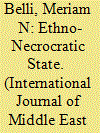

|
|
|
|
|
| Summary/Abstract |
Using the unique and historic Islamic cemetery of Mamillah in Jerusalem as a primary example, this essay discusses the ethno-necrocratic order that led to the 2008 Israeli High Court of Justice's codification of the supremacy of Jewish bodies and afterlives over non-Jewish ones, on the basis of advancing Israel's values. Hundreds of Palestinian burial grounds, starting with village cemeteries, have been destroyed since 1948. Indeed, funerary sites have testified to the omnipresence and millenarian existence of a population that the state has sought to erase from memory. In a few decades, the deathscape was radically altered, in cities as in the countryside. Although real estate corruption plagues Israeli politics, land use planning and real estate capitalism are inseparable from the ethno-racial politics of exclusion, which affect both the dead and the living.
|
|
|
|
|
|
|
|
|
|
|
|
|
|
|
|
| 2 |
ID:
142837
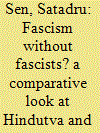

|
|
|
|
|
| Summary/Abstract |
This essay examines some aspects of Hindutva and Zionism, taking a comparative approach that underlines the ubiquity—i.e. the comparability—of fascisms in the articulation of modernity. It focuses on the imaginary of race, place and peoplehood in each ideology, the roles of majorities and minorities in the formulation of national well-being, and possible exit strategies from violently exclusivist statecraft. It explores, also, an intellectual prehistory in which Indian nationalists cultivated a fascination with Jews and Zionism as part of their understanding of a race constituted by historical damage and the imperative of repair. It argues, first, that the comparative study of fascisms is not only valid, but necessary to the politics of democracy. Second, it argues that because Indian fascism is less racialised than the Israeli version, it is more open to contestation and mitigation by the deployment of alternative imaginaries of ethnicity and nationhood.
|
|
|
|
|
|
|
|
|
|
|
|
|
|
|
|
| 3 |
ID:
185503
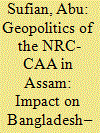

|
|
|
|
|
| Summary/Abstract |
The present study examines the contemporary Bangladesh–India relationship analyzing the dynamics of geopolitics centring the National Register of Citizens (NRC) and the Citizenship (Amendment) Act (CAA)-2019 in Assam, India. On the basis of secondary data, this paper explores the historical and geopolitical roots of volatile present and uncertain future of the non-registered people, often termed as ‘illegal Bangladeshi migrants’ living in Assam, portrayed by the Indian ethnocratic state sidelining India’s longstanding pluralist traditions and exercises. The central argument of the study is that peddling the issue of ‘illegal Bangladeshi migrants’ by Indian political elites is destined to transcend the boundary infusing hostility in future into Bangladesh–India relationship.
|
|
|
|
|
|
|
|
|
|
|
|
|
|
|
|
| 4 |
ID:
164907
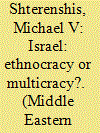

|
|
|
|
|
| Summary/Abstract |
Much of the recent academic literature that assesses democracy in Israel labels it either as incomplete or flawed, yet such literature employs minimal systematic analysis of how the state is actually governed. Since the 1990s, there has been a tendency to describe the Israeli political regime as an ethnocracy. This article argues that the term ‘ethnocracy’, when applied to Israel, has certain weaknesses and instead proposes the concept of ‘multicracy’ (multiformocracy) as a more appropriate term by which to describe Israel's political organization. It will demonstrate that existing Israeli democratic institutions do not control the state's policymaking in full and that several politically important processes are controlled or at least influenced by various other politically active forces. Whilst these forces can influence, stimulate, inhibit, and otherwise change governmental decisions and actions, they can be labeled as kratiae. While the capacity of Israel's democracy to govern is weak, these other kratiae can intervene in policymaking and the state's regime acts as democracy-dominated multicracy.
|
|
|
|
|
|
|
|
|
|
|
|
|
|
|
|
| 5 |
ID:
110760
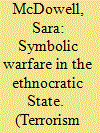

|
|
|
|
|
| Publication |
2012.
|
| Summary/Abstract |
Ethnocracies defend and protect the hegemony and territory of a dominant ethnic-nation. This article considers how paramilitary or guerrilla organisations professing to act on behalf of minority groups have used non-violent spatial practices such as memorialisation to contest the authority of the ethnocratic state and reassert their own (with varying success). Within ethnocracies where territory is fiercely contested memorialisation has the specific capacity to extend the parameters of conflict constituting a form of symbolic warfare. In exploring the nexus between memorialisation and territoriality this article reflects on the symbolic conflict between the LTTE and the Government of Sri Lanka before the former's obliteration in May 2009.
|
|
|
|
|
|
|
|
|
|
|
|
|
|
|
|
|
|
|
|
|